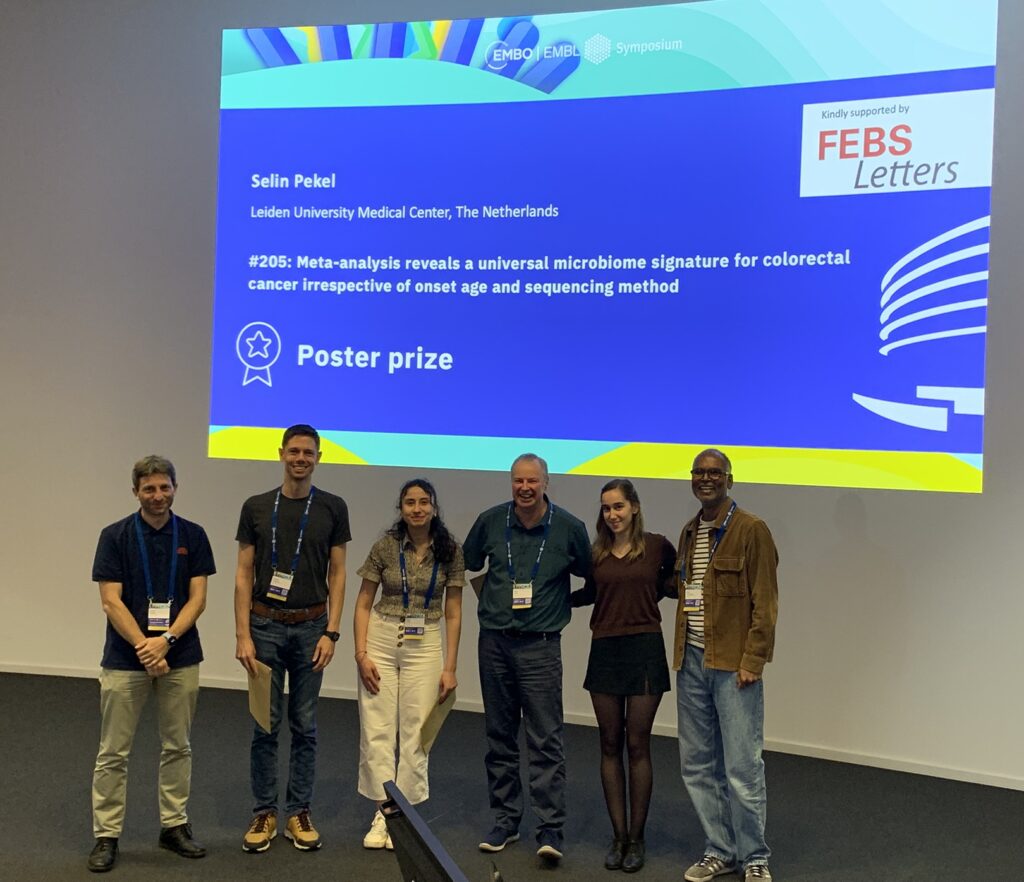Best poster prizes at ‘The human microbiome’
The EMBO | EMBL Symposium ‘The human microbiome‘ took place in September at EMBL Heidelberg and virtually.
Various initiatives are underway around the world to survey the human microbiota at several body sites, characterise them, understand their interactions with the human hosts, elucidate their role in diseases, and design possible therapeutic or dietary interventions. Recent efforts have started mining the human microbiome data to discover bioactive compounds, detect interactions between microbes and molecules, and design novel interventions. Every other year, our long-standing meeting brings together the community to discuss latest developments across the field, including topics like:
- Methodological advances in microbiome analysis
- The human microbiome across biological age
- The human microbiome’s response to nutrition and drugs
- Host-microbe interactions
- Integrative approaches in microbiome research
- Microbiome-targeted therapeutics
- Future outlook for microbiome research and translation
For this year’s edition of the meeting, we had 385 people attending on-site and 125 participants joining remotely. There were 22 fellowships provided by the EMBL Corporate Partnership Programme and EMBO. With the total of 248 posters to view (tough competition!), we held two poster sessions during which the presenters could discuss their research — their work was then voted for by all participants. There were three poster prizes awarded during the meeting. We are pleased to share with you two of the winners’ abstracts!
Impact of combination antiretroviral therapy on the gut microbiome of people living with HIV: insights from the 2000HIV study
Presenter: Ángela Del Castillo Izquierdo
Authors: Ángela Del Castillo Izquierdo, Yue Zhang, Hermie JM Harmsen, Andre Van Der Veb, Jingyuan Fu

University Medical Center Groningen, The Netherlands
Abstract:
HIV infection alters the composition and function of the gut microbiota, which might contribute to chronic inflammation and immune dysfunction. HIV-associated dysbiosis persists even during combination antiretroviral therapy (cART), with some regimens aggravating the gut dysbiosis of people living with HIV (PLHIV). Previous studies sought to study the impact of different ART regimens on the gut microbiome; however, these were conducted with small cohorts and failed to account for important covariates such as sexual behaviour. Furthermore, PLHIV often switch ART regimens, which may complicate the interpretation of results.
Here, we aim to investigate the differences in the gut microbiome associated with cARTs by analysing the faecal metagenomics, serum metabolomics and plasma proteomics from 1,586 participants of the 2000HIV study. Thus, we identify distinct microbial signatures linked with current and accumulative drug usage, while accounting for 277 phenotypic variables. Overall, we observe differences in bacterial profiles among NNRTI drugs; specifically, Efavirenz users have lower alpha diversity compared to other drug treatments, as well as lower abundance of known commensal bacteria such as Faecalibacterium prausnitzii and Ruminococcus birculans. We anticipate that these findings will contribute to a deeper understanding of drug toxicity and may facilitate the development of more personalized drug regimens for PLHIV, thereby improving their quality of life.
Meta-analysis reveals a universal microbiome signature for colorectal cancer irrespective of onset age and sequencing method
Presenter and author: Selin Pekel

Leiden University Medical Center (LUMC), The Netherlands
Abstract:
The gut microbiome is increasingly recognized as a key player in colorectal cancer (CRC) development and progression. Numerous studies have identified microbial shifts associated with CRC; however limited sample size and heterogeneity in sequencing approaches and patient populations have hampered cross-study comparisons and the analysis of the disease subgroups.
To address these challenges, we performed the largest single-disease microbiome meta-analysis to date, combining whole genome shotgun (WGS) and 16S rRNA gene sequencing (16S) data from 27 studies spanning 15 countries (N = 6,779). We uniformly processed and harmonized taxonomic profiles across 1,948 WGS and 4,831 16S fecal samples to identify a microbial signature associated with CRC. Association testing and machine learning (ML) modeling delineated a CRC microbiome signature that was robustly generalizable across studies, sequencing data types, and age of CRC onset (AUROC >= 0.78). Contrary to earlier reports suggesting distinct microbiome signatures in early-onset CRC, our results support the existence of a unified, generalizable CRC-associated microbiome signature. This signature was marked by consistent enrichment of genera such as Parvimonas, Peptostreptococcus, Fusobacterium, and Porphyromonas. Having demonstrated that ML classifiers generalize well across sequencing approaches and age of onset, we next constructed a unified microbiome-based CRC classifier, which achieved an AUROC of 0.84. We also explored how detection accuracy varied across age of onset, tumor location, stage, and precursor lesions associated with CRC classification scores. CRC classification scores showed a progressive increase from stage 0 to stage IV tumors, consistent with an increasing microbiome signal across cancer progression. Adenoma samples exhibited lower detection rates but intermediate classification scores. Detection was generally higher for distal and rectal tumors compared to proximal tumors, a trend mirrored by the positivity rates of key CRC-associated genera. Altogether, our study defines a robust and generalizable microbial signature of CRC that is consistent across sequencing approaches, tumor characteristics, and age of CRC onset, demonstrating the reproducibility of CRC-associated microbiome changes at a global scale.
Poster prize kindly sponsored by FEBS Letters

Find out more about the #EESMicrobiome conference from the blog post written by Deepika Pateriya, who participated as an event reporter!
The EMBO | EMBL Symposium ‘The human microbiome‘ took place from 16 – 19 September 2025 at EMBL Heidelberg and virtually.